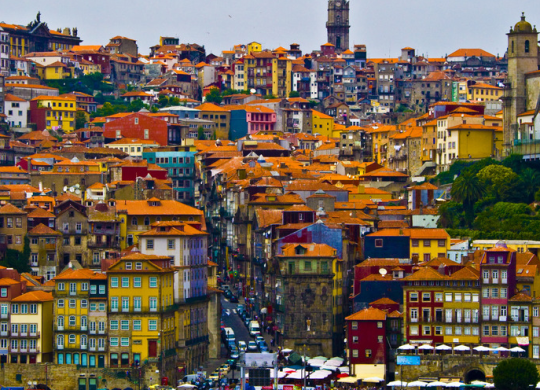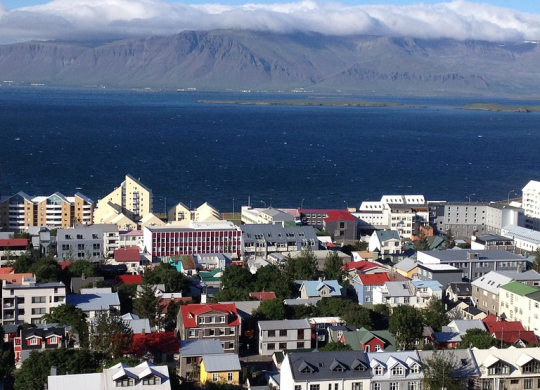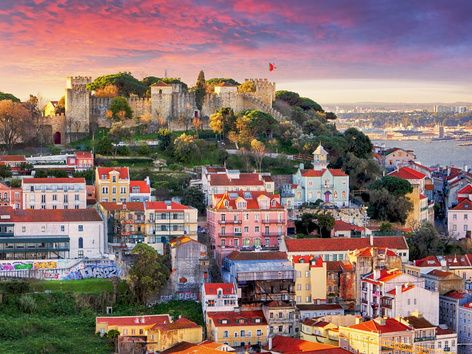Job in Portugal for expats in 2024: labor market, where to look for work, types of work visas, features of signing an employment contract and much more
Table of contents

Portugal is a promising country for expat employment, attracting many foreigners. However, the local labor market has its own characteristics. Find out where most foreigners work in Portugal, what requirements are imposed on applicants, how to look for a job and many other interesting information about employment in Portugal.
Due to its location and climate, Portugal attracts many tourists. They come for new experiences, the opportunity to relax on the Atlantic coast, enjoy the measured rhythm of life and picturesque landscapes. Many guests also dream of staying in this country forever. Employment in Portugal opens up great opportunities for a potential immigrant. However, not everything is simple here. The main steps for employment of expats in Portugal are discussed later in this article.
Requirements for foreigners for employment in Portugal
The Portuguese labor market has been actively developing in recent years, many new companies are opening here, as well as representative offices of international corporations, most of them in such large cities as Lisbon and Porto. However, before applying, it is important to find out whether you have the right to work in the country, in most cases it depends on the citizenship of the applicant.
- EU/EEA or Swiss citizens
Citizens of European countries have the right to live and work in Portugal without any restrictions. If you decide to stay in the country for more than 3 months, you must register your address with the local town hall and obtain a residence permit (Certificado de Registo).
- Third-country nationals
Citizens of non-EU countries will find it more difficult to find work in Portugal. This is because this category of foreigners must first find a job and sign a contract, and only then apply for a visa.
Highly skilled workers or those working in industries with high demand have a high chance of finding work in Portugal.
To work in Portugal, you can obtain one of the following visas:
- Work visa for skilled workers.
- Work visa for self-employment.
- Work visa for highly skilled workers.
- Work visa for cultural activities.
- Work visa for studies.
- Work visa for technical specialists.
- Passive income visa.
For foreigners who have the opportunity to work remotely, Portugal offers a digital nomad visa, valid for two years.
Important! In 2024, the Portuguese Government confirmed that citizens of non-EU countries will no longer be able to migrate to Portugal without an employment contract.
That is, if previously foreigners could come to Portugal on a tourist visa, find a job and obtain a residence permit, from now on migrants who want to move to Portugal will first have to find a job, sign a contract and only then enter the country. For more details on the new rules for obtaining a residence and work permit in Portugal, see the link.
Where do expats work in Portugal?
Expats who do not speak Portuguese may find it difficult to find work in the country. However, this category of citizens can find employment in modern industries such as technology, scientific research and engineering.
There are also many vacancies in the following sectors: tourism and hospitality, healthcare, education, etc.
Portugal offers excellent employment opportunities for foreigners. Read more about the job market and the most in-demand jobs in Portugal in 2024 here.
You will need health insurance to safely move and find employment in a new country. You can issue an extended policy on our website using the link.
How to find a job in Portugal?
The best ways to find a job in Portugal include using online job portals, recruitment agencies, networking and the expat community:
- The best online portals for finding a job in Portugal: Indeed, Express Emprego, Net Emprego, Career Jet.
Also, many companies post job offers on their own websites, so if you dream of working for a specific company, then visit their official portal.
- Recruitment agencies - another convenient way to find a job in Portugal is to register with recruitment agencies that operate there. Recruitment agencies will help you find the perfect job in Portugal and save you the stress of checking your qualifications. Some recruiters will even have access to job listings that were not publicly available, which gives you an advantage. The following agencies are popular in Portugal: Michael Page, Hays.
- Networking – If you are already in Portugal, attend job fairs, industry events, seminars and meetups to connect with professionals in your field. Even networking on LinkedIn is a great way to make connections.
- Expat community – Thousands of expats live in Portugal, from all over the world, including Tunisians, the Philippines and Sri Lankans. The expat community is large and strong. Don’t be afraid to join expat groups online and in person to meet like-minded people and make new connections in Portugal. The largest expat communities in Portugal were discussed in this article.
When looking for a job in Portugal, it is important to:
- carefully study reviews about the employer or agency;
- not be afraid to ask questions and clarify details with the HR manager;
- pay attention to possible discrepancies between the vacancy and what is offered to the employee: place of work, schedule, job responsibilities;
- clarify with the employer the fact of approval of the candidacy, and also - be vigilant with young companies.
Documents that must be provided to the employer:
- diploma of education (with international confirmation);
- confirmation of work experience in the specialty;
- letters of recommendation from former employers or clients;
- certificates confirming language skills (English and Portuguese), as well as - diplomas of improving the level of qualification.
What are the features of signing an employment contract with a Portuguese employer?
An employment contract is a mandatory document on the basis of which a foreigner is issued a work permit, work visa and temporary residence permit. It must specify all points related to the position and responsibilities:
- place of work with the exact address;
- position and relevant responsibilities;
- salary level (before tax);
- exact work schedule, amount and period of bonuses paid;
- contract term;
- length of probationary period;
- number of days off and holidays;
- requirements for notice periods upon dismissal.
Important! Since all documentation is drawn up only in the state language, some employers may include clauses in the contract that were not previously agreed upon. In any case, the employee is not obliged to sign the document here and now, because he has the right to take the papers home for a day for review.
What points of an employment contract in Portugal should you pay special attention to:
- Type of employment contract: since most of the above contracts in Portuguese are very similar to each other, there is a possibility of receiving an employment contract for an indefinite period of work (Contrato de trabalho a termo certo) instead of a contract with a fixed term of 1-2 or 5 years (Contrato de trabalho a termo certo). And so you risk being fired at any time, precisely because of the wording - the uncertainty of the term. Also, do not confuse an employment contract and a contract for the provision of services. The latter is not an employment contract and the company does not bear any responsibility to the employee.
- A clause providing for the inadmissibility of competition (pacto de não concurrence). When signing such a contract, the employee undertakes not to be hired for work in the same field for a specified period (up to 2 years) after dismissal. Violation of this clause will lead to the need to pay material compensation, which is usually much higher than the average annual income. But the clause on dever de não concurrence, which also applies to competition, should not scare you. Such an obligation ends with the termination of the contract.
- The deadline for submitting a resignation. In some cases, the termination of the contract can be extended by 6-10 months.
In addition to the individual employment contract, the relationship between the employee and the employer in Portugal is regulated by a collective agreement, which is mandatory for every employee to read.
What is it like to work in Portugal?
The normal working week in Portugal lasts from Monday to Friday from 9:00 to 18:00, with a lunch break of one to two hours. The legal maximum is an eight-hour working day and 40 hours per week.
Full-time employees are entitled to 22 days of paid leave per year. In addition, there are 13 public holidays.
The current minimum wage in Portugal is €820 per month, which translates to €11,480 per year, with 14 payments made over this period.
What is important to know before immigrating to Portugal?
- The cost of living in Portugal is lower than in many Western European countries, but can vary depending on the region. Lisbon and Porto are more expensive, while smaller towns and rural areas are more affordable.
- As an employee, you will be subject to progressive income tax rates in Portugal, which range from 14.5% to 48%. Employers process tax deductions automatically. Another advantage of Portugal is its loyal Non-Habitual Residence (NHR) tax system.
- After five years of continuous residence in Portugal, you can apply for permanent residence, which gives you the right to live and work in the country for an unlimited period. Once you have obtained your residence permit, you can apply for family reunification to bring your spouse, children or dependent relatives to Portugal.
- Non-EU driving license holders will need to take a driving test unless your country has a reciprocal agreement with Portugal.
- Portugal is known for its friendliness and hospitality towards immigrants. The Portuguese tend to be tolerant and open to foreigners.
Moving to Portugal is an important step in your expat career, which will be a wonderful stage in your life. Therefore, be sure to pay attention to this country when choosing a country to move abroad.
We will remind you! The Portuguese D7 visa can be obtained by financially independent foreigners with passive income. This permit has become especially popular after the abolition of the “golden visa”. We have already told you what the conditions are for obtaining a D7 visa in 2024.
Igor Usyk - Head of Legal Department at Visit World
For safe relocation to Portugal, obtaining refugee status and employment, use the advice of an international lawyer.
We help to solve complex and simple issues for your comfort and safety in Portugal.
We monitor the accuracy and relevance of our information. Therefore, if you see any error or discrepancy, please write to our hotline.
Recommended articles
2 min
Work
Job in Iceland for foreigners in 2024: labor market, work visa and basic requirements
Iceland is known for its breathtaking landscapes, but few people know that it also has a market economy that is actively developing. With competitive wages and job opportunities, the country offers good career prospects. Find out what it takes to get a job in Iceland in 2024
18 lis. 2024
More details2 min
Work
Internship in Portugal: 14 reasons to upgrade your qualifications abroad
An internship abroad can give you a competitive edge when looking for a job in the future, allowing you to take a fresh look at your specialty and develop skills that you can use for years to come. Read more about the reasons why you should choose Portugal as an internship country below
11 mar. 2024
More details4 min
Expats
Best cities in Portugal for expats in 2024
Are you planning to move to Portugal? We have prepared for you a selection of popular cities in this country that are expanding their expat community every year. Find out which cities are recognized as the best for expat life in Portugal in 2024
17 kwi. 2024
More details2 min
Work
The concept of a four-day work week is gaining popularity in the world. Find out which countries are still testing the reduction of the working week, and which states have already approved the updated work schedule for their employees
05 lis. 2024
More detailsAll materials and articles are owned by VisitWorld.Today and are protected by international intellectual property regulations. When using materials, approval from VisitWorld.Today is required.
